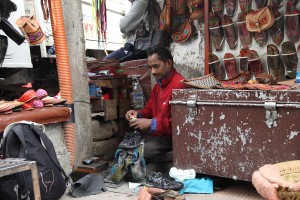
Photo: George Lubikowski
Just two minutes from the main square in McLeod Ganj, at the top of some steps, is a roadside corner reserved for Doctor Shoe. He has two metal trunks which never move. Each morning at 8.30am, unless the weather is impossible, they are unpacked and his shop display of colourful hand-crafted shoes, leather handbags and shoe laces is hung from the wall and eaves.
Born in Rajasthan, Ramesh had polio as a child which left him lame and walking with difficulty his whole life. He comes from a large family and his father and grandfather were in the same trade. But working with leather, namely dead animals, is considered a low-caste profession – and his family were regarded as untouchables.
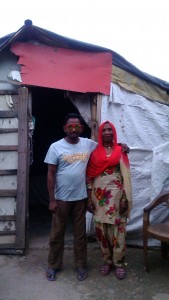
Ramesh and his wife outside their home in Dharamshala
In 1993, marriage was arranged to a young woman from Rajasthan. Shortly after, they came to live in her family’s community in Dharamshala, in what he matter-of-factly describes as the slum part of town, where they live to this day. His first son, now 22, was soon born and he eventually had to support four children, his wife and her parents.
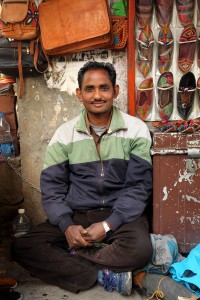
Photo: George Lubikowski
Living in Dharamshala, Tibetans figure large in Ramesh’s life. In 2004, a monk came to help the community. Lobsang Jamyang was attached to the Tong-Len “Compassion in Action” charity. He organised education for the children, and medical facilities and care. In short, he totally transformed their lives and is never forgotten. Similarly, Lha has provided aid and assistance to the village. They have given Ramesh second-hand clothes and items to distribute to the needy, and pay visits to screen informational movies about hygiene, diet and medical issues. He asks for particular mention of Neil “the American” and Tapsang.
Once the Dalai Lama, visiting Tong-Len to open a new hostel, touched Ramesh’s hand in greeting – a day he remembers with pride; very special. Indeed, Ramesh is a thoughtful, spiritual man. He says we all have to pay for karma, good and bad. Under the guidance of Radha Soami Satsang Beas, a philosophical organisation which has its origins in India and is based on the spiritual teachings of all religions and dedicated to a process of inner development, he’s a strict vegetarian – no alcohol – and often rises at 3.30am to meditate while the family is sleeping. Statues in temples play little part in his life; for him it is “Work and worship”.
Dr Shoe’s business card, which promises to give new life to your shoes, also proclaims “Everything is possible in India.” When I sit with him at the roadside, I get a sense that this is because of the immense network of friends and caring people that surrounds him daily. In 2006, struggling on steps with his bad leg, he fell. The result was a broken leg which put him out of work for six months – a catastrophe for anyone with family and dependents to support. But it was friends – Indian, Tibetan and visitors from around the world – who kept him afloat with their generosity, and supported him through that trauma. Another time, when he wanted to sell new Rajasthani shoes, a Dutch friend simply gave him money to buy the stock. Other acts of generosity from friends are too many to list.
Ramesh remembers a Bhagsu road with hardly any traffic, more monks and fewer hotels; no concrete. Even the weather has changed. Before, it was cooler with more snowfall in winter, November to February. Now it’s warmer. There are fewer foreigners, even than six or seven years ago. Several other shoemen operate along the street nearby, but he insists there is no rivalry between them – hard to believe during quiet times when customers are scarce. His is the only display of new shoes and handbags.
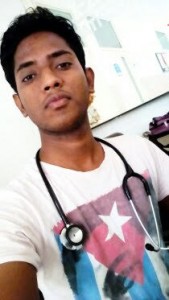
Ramesh’s son Vinay
But Dr Shoe is a happy man. “Even if I was rich, I wouldn’t want to stop my work,” he tells me. “It’s good for looking after my family.” He speaks of his elder son with pride, describing his nursing studies. But the old low-caste stigma still rankles. Attitudes have changed, but still in some places in Rajasthan, if he drinks tea in a dhaba, he is served at an arms length and told to clean his own glass. “They don’t like us touching their things and they view us as dangerous… They don’t want us to be successful… We don’t get government jobs.” So the big dream is that one day his son will return to the village as a doctor and treat those same people who have scorned them with an attitude of contempt. “You either die or you let him treat you,” he imagines telling them, with a wry smile.
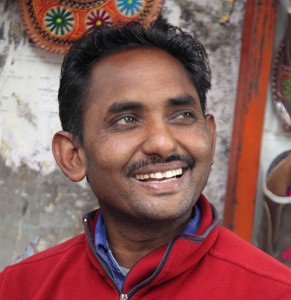




 Print
Print Email
Email













